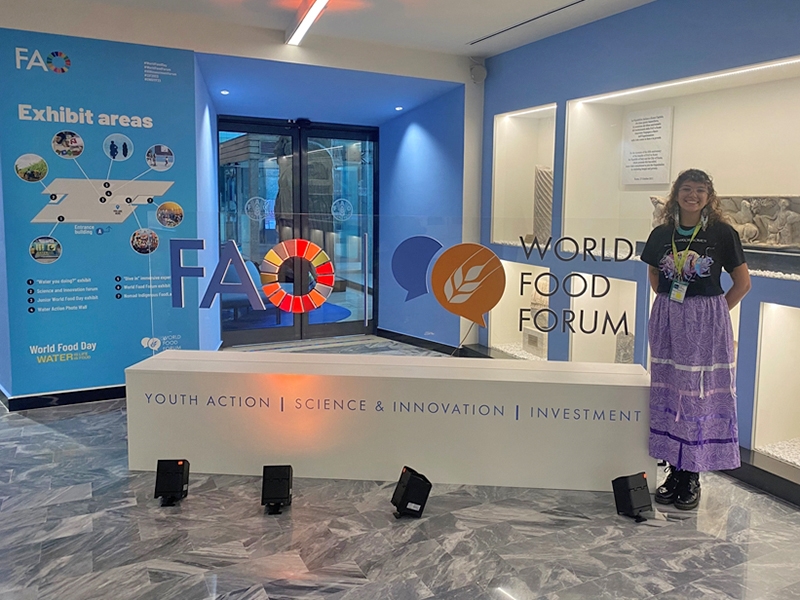In a journey that began in July and culminated in October, Mallory Stinnett, an environmental science major and entomology minor, found herself representing U of A's Dale Bumpers College of Agricultural, Food and Life Sciences and the Muscogee Creek Nation at the United Nations headquarters for Food and Agriculture Organization in Rome.
As a member of the Global Indigenous Youth Caucus, Stinnett shared her experiences and insights on food sovereignty, creating lasting connections with Indigenous communities worldwide.
"While we [the participants] were all there for initially the same thing, we all had different reasons to be there," Stinnett said. "It was heartwarming to hear other people talk about how much they care for their community, whether that was reindeer in the Norwegian Arctic or how cooking can be a spiritual experience."
The Global Indigenous Youth Caucus, comprising individuals aged 18 to 30, serves as a platform for young leaders to advocate for food sovereignty in their tribes and communities. Stinnett, selected as part of the North American delegation, joined 150 participants from over 90 Indigenous communities.
"I was with 15 people from the United States and dozens of people from all over the world," she said. "It was crazy and really amazing."
"I am impressed that she [Stinnett] undertook the journey alone!" said Michelle Wisdom, U of A horticulture instructor. "She wasn't alone for long, as she made friends and contacts from all over the world."
Stinnett's journey unfolded against the backdrop of her work with the Tribal Alliance for Pollinators, a non-profit organization based in Bixby, Oklahoma. Her efforts in prairie habitat restoration took a new turn when the organization introduced a food element called Food Initiative for Tribes.
Mallory led classes on growing food and promoting healthy eating choices on the Muscogee Creek Reservation, classified as a food desert.
"Mallory's experience working at the Tribal Alliance for Pollinators, growing, giving away and installing native pollinator plants to Indigenous people in the area fits in with her horticulture education," said Summer Rae Wilkie, co-adviser of the Native American Students Association at the U of A and youth coordinator for the Indigenous Food & Agriculture Initiative. "She has also committed to interning with Native American Student Services, focusing on the representation of traditionally significant native plants on campus."
"It was far from home," Stinnett said in describing her role and first trip out of the country. "When I'm at school, I'm a part of NASA, but I'm still two hours away from my tribe and my family. This felt like I brought them with me all the way to Rome."
"Mallory's passion for horticulture, specifically native prairie habitats and prairie/pollinator conservation, is an inspiration to me," said Wisdom, a member of the Cherokee Nation. "Mallory has made the most of every educational opportunity that has come her way, all while celebrating her Native American heritage."
The caucus provided a unique platform for participants to exchange ideas, share initiatives and build a supportive community. Stinnett emphasized being a continuous member of the caucus means ongoing opportunities, with invitations to events like the United Nations Permanent Forum and climate change forums in Dubai.
"We're all just part of this community now," she said. "We've all kept in touch since it's happened, and we share our opportunities."
As Stinnett looks forward to continuing her work in habitat restoration and botany, she encourages others to apply for the Indigenous Youth Caucus.
"I would definitely encourage anybody who's ever worked in food sovereignty to apply," Stinnett said. "It is amazing, incredible, a once-in-a-lifetime experience."
Her journey serves as a testament to the power of Indigenous voices coming together to create positive change for future generations. Stinnett's commitment to representing her tribe and sharing experiences highlights the importance of diverse perspectives in shaping global conversations on food sovereignty and Indigenous rights.
About the Dale Bumpers College of Agricultural, Food and Life Sciences: Bumpers College provides life-changing opportunities to position and prepare graduates who will be leaders in the businesses associated with foods, family, the environment, agriculture, sustainability and human quality of life; and who will be first-choice candidates of employers looking for leaders, innovators, policy makers and entrepreneurs. The college is named for Dale Bumpers, former Arkansas governor and longtime U.S. senator who made the state prominent in national and international agriculture. For more information about Bumpers College, visit our website, and follow us on Twitter at @BumpersCollege and Instagram at BumpersCollege.
About the University of Arkansas: As Arkansas' flagship institution, the U of A provides an internationally competitive education in more than 200 academic programs. Founded in 1871, the U of A contributes more than $2.2 billion to Arkansas' economy through the teaching of new knowledge and skills, entrepreneurship and job development, discovery through research and creative activity while also providing training for professional disciplines. The Carnegie Foundation classifies the U of A among the few U.S. colleges and universities with the highest level of research activity. U.S. News & World Report ranks the U of A among the top public universities in the nation. See how the U of A works to build a better world at Arkansas Research and Economic Development News.
Topics
- Agriculture
- Belonging
- International
- Points of Pride
- Food & Nutrition
- Student Success
- Dale Bumpers College of Agricultural, Food & Life Sciences
- Division of Student Affairs
- Department of Crop, Soil and Environmental Sciences
- Environmental, Soil and Water Science Program
- Department of Horticulture
- Registered Student Organizations
- Department of Entomology and Plant Pathology
Contacts
Ariel Scholten, graduate assistant
Dale Bumpers College of Agricultural, Food and Life Sciences
479-575-4625,
